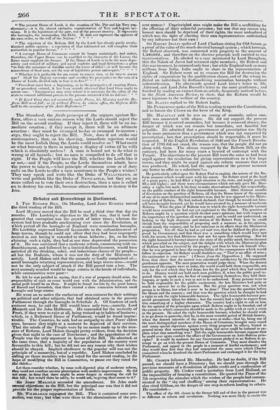• The Standard, the facile princeps of the arguers against
Re- 'form, offers a very curious reason why the Lords should reject the .3E11 on the second reading. If they reject it, there will be an im- seediate creation ; if they accept it, there will be an ultimate oreation : they must be swamped to-day or swamped to-morrow ; ergo, they ought to reject the Bill. Now, does it not strike our contemporary, that, on his showing, immediate rejection would be the most foolish thing the Lords could resolve on ? What merit or What bravery is there in making a display of virtue (if he will) -which is absolutely useless ? A man is bound not to do what is ;wrong at all hazards ; but no man is compelled to do all that is sight. If the People will have the Bill, whether the Lords like it or not,—and • if the People, as the Lords themselves admit, have the power to take it,—what principle of common sense or of duty cells on the Lords to offer a vain resistance to the People's wishes? 'They may speak and write like the Duke of WELLINGTON, or ,Write and publish like the Duke of NEWCASTLE, but they are no snore called on to vote their own destruction, than a man is called on to destroy his own life, because others threaten to destroy it for him.


























 Previous page
Previous page